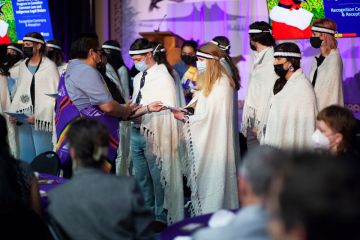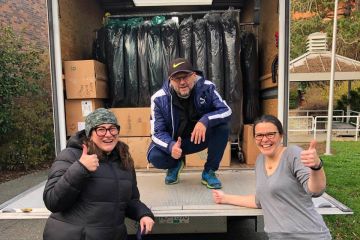Grads travel to France to experience the Middle Ages
From June 1-14, Bryan Solly, Ryan Hunt and I-all 2009 UVic Medieval studies grads-were privileged with the opportunity to travel to Montpellier, France, to study three different medieval manuscripts.The trip was the capstone to our undergraduate degrees. Our two weeks were spent attending lectures at the Universit&e#180; Paul-Val&e#180;ry Montpellier III and researching our manuscripts at the Bibliothèque Universitaire de M&e#180;decine.
A month before we left for France, we each received a research question related to the manuscript we were to receive. My question, for example, was to investigate the purpose of the Jerusalem map in manuscript H142. I was to use the physical features of this historical anthology to discover why the map was included.
Bryan and Ryan both had to discover the uses of their manuscripts through physical features as well. Bryan worked on a text containing philosophical texts, and Ryan studied a book of law.
The trip to France presented each of us with a variety of "firsts." For one thing, none of us had ever been to Europe, the very place which we have studied for at least four years. We had the opportunity to do some additional travelling to the surrounding countryside (such as Paris, Avignon, Nimes, and Carcassonne) in order to see first-hand the objects of our studies.
The most important "first," in my opinion, was the research we were able to conduct while at the Bibliothèque Universitaire de M&e#180;decine. It was our first chance to work with an entire manuscript. Each of us had taken at least one class at UVic pertaining to Medieval manuscripts. In these classes we were able to access the small collection of manuscript fragments that our library has. To be able to actually hold and study an entire manuscript was something we would not have had the opportunity to do had it not been for the Medieval Studies Program's initiative to create ties with the library and university in Montpellier.
You can learn so much more by having a whole book, rather than one page, to work with. In my case, I was able to determine the contents surrounding the map, which helped lead me to the conclusion that the map was intended to visually explain the surrounding historical works on Jerusalem. Had I only been able to look at the map, which the library sent to me digitally, I might not have been able to arrive at this same conclusion. I would also have missed out on the wonderful opportunity to experience a different culture, learn from different professors, and put to use the skills I have accumulated over four years of study at UVic.
The trip to Montpellier was a once-in-a-lifetime opportunity for all of us. For me, it reinforced my decision to continue studying the Middle Ages. It gave me a greater appreciation for what I have already learned and a desire to delve into areas of history I had never considered before. I think I can speak on behalf of all of us and say that this trip has given us the drive to continue along an academic path revolving around the discovery of Medieval history.
About the exchange
UVic's Faculty of Humanities owes its current exchange agreement with Universit&e#180; Paul Valery-Montpellier III, in Montpellier, France, to Dr. Claire Carlin. In 2006-07, she negotiated the arrangement according to which several academic units contribute to the costs of the program in return for their own exchange opportunities. There have already been some individual faculty exchanges, but this was the first time that students have been involved (some of the funding for the students' travel also came from generous donors to the Medieval Studies Program). Dr. H&e#180;lène Cazes (French, continuing studies) worked with the manuscript librarian in Montpellier and laid the foundations for the three graduating students to undertake their capstone research projects.
In this story
Keywords: grads, experience, middle, ages




